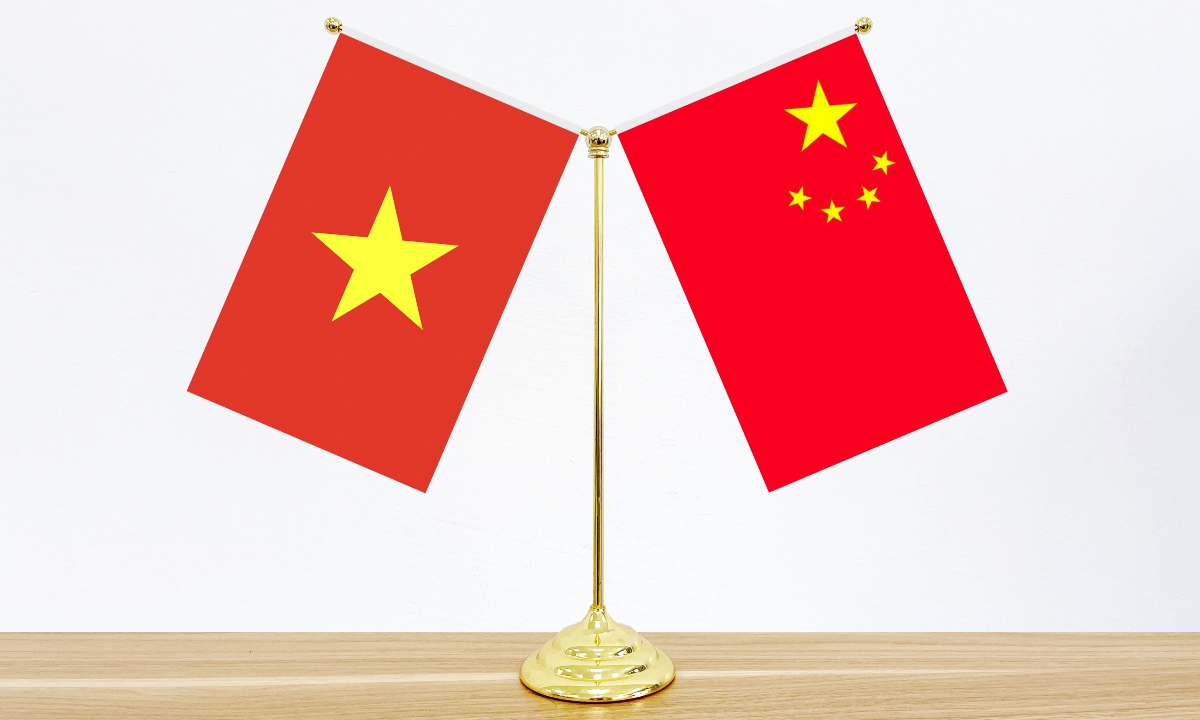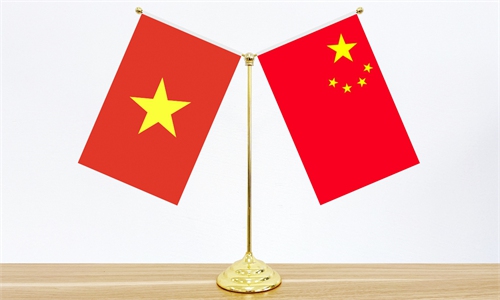China, Vietnam jointly build 'a shared future' of peace, prosperity, defying Western smearing

China Vietnam Photo: VCG
After a successful visit to Vietnam by Xi Jinping, general secretary of the CPC Central Committee and Chinese president, China's 2023 head-of-state diplomacy wrapped up in Vietnam with solid, detailed plans for the future, amid a warm and passionate atmosphere.
Experts from both China and Vietnam said that the consensus reached by the two sides on jointly building a China-Vietnam community with a shared future that carries strategic significance is a strong signal of bringing great certainty, confidence and energy to the development and peace not just for the two countries but also to the whole region.
At the same time, some external forces and Western media which want to undermine the peace of the Asia-Pacific region might be jealous and get anxious, and will try to misinterpret and downplay the significance, this only exposes their anxiety, said analysts.
Tremendous hospitality
Shortly after the 20th National Congress of the Communist Party of China (CPC) came to a successful conclusion in late October, 2022, General Secretary of the Communist Party of Vietnam Central Committee Nguyen Phu Trong became the first foreign leader to visit China.
This time, the state visit to Vietnam as the successful culmination of China's diplomatic efforts this year is of great importance, said Xi on Wednesday as he concluded his two-day state visit to Vietnam, the Xinhua News Agency reported.
Xi made the remarks as he and his wife, Peng Liyuan, bid farewell to Trong and his wife, Ngo Thi Man, before returning to China. Throughout the years, leaders of both parties and countries have consistently maintained close communication, reaching numerous crucial agreements to guide the cooperative development of bilateral ties.
Xi received tremendous hospitality from Vietnam on his latest visit. When Xi arrived in Hanoi, he received a high-level reception, with Vietnamese Prime Minister Pham Minh Chinh welcoming him at the airport on Tuesday, and Vuong Dinh Hue, chairman of the National Assembly of Vietnam, as well as the fourth-highest ranking official, seeing him off at the airport Wednesday.
When President Joe Biden arrived in Hanoi in September, he was received at the airport by Chairman of the Commission for External Relations of the Communist Party of Vietnam Central Committee Le Hoai Trung.
The reason why Vietnam highly values its ties with China is that there are two unique elements that the US will never have in its ties with the Southeast Asian country: firstly, China and Vietnam are both socialist countries and they sincerely wish each other greater successes on the path of socialism, and they face similar ideological threats against their political security; secondly, the two countries are neighbors with close trade ties, historical bonds, traditional friendship and huge demand and potential for cultural and people-to-people exchanges despite frictions and disputes from time to time, said analysts.
Common path, shared future
Through interviews with scholars and experts in Hanoi, the Global Times reporters found that Vietnamese people attach great sincerity and hope to ties with China, and expect China's successful development to also help Vietnam meet its demand for economic development. Chinese analysts said this is the strong endogenous power that drives the two countries to form a community of shared future that carries strategic significance.
Nguyen Vinh Quang, vice president of the Vietnam-China Friendship Association and former minister counselor-deputy ambassador of Vietnam to China, told the Global Times that "there is great potential for cooperation between the two countries. There are many similarities between the development paths of the two countries, and exchanges of theoretical and practical experience and mutual learning are highlights of bilateral cooperation."
The two sides are also highly complementary. "Vietnam is rich in agricultural and aquatic products, which can meet China's demand… Both countries are committed to green development, the use of clean energy and the development of the digital economy, which are new areas in which China has advantages," said Quang.
Chinese modernization will also benefit Vietnam's efforts to realize its own modernization. "China is the world's second largest economy with a higher level of productivity. Vietnam and China are both socialist countries, adhere to the leadership of the Communist Party, and their social and economic management mechanisms are relatively close, so Chinese modernization is instructive and valuable to Vietnam's economic and social development," Quang noted.
Nguyen Tang Nghi, vice dean of the Faculty of International Relations at Vietnam National University of Ho Chi Minh City, told the Global Times that "China is a great power in technology, digital transformation, artificial intelligence and so on. In addition, China is considered to be a leading country in providing support and investment for global industrial and infrastructure development."
China has experience, capability and influence in these crucial areas, and Vietnam's economic and social development also needs China's support. "Hopefully, Vietnam and China can carry out more practical and in-depth cooperation in infrastructure construction, transportation and other fields so as to lay a solid foundation for the development and upgrading of bilateral relations," said Nghi.
"Vietnam is also showing an example to the Philippines. No matter how many disputes and frictions we have in the South China Sea, as long as we sincerely want cooperation and manage the differences, China and Vietnam will not let the disputes dictate the bilateral ties and avoid escalations on maritime issues. This is totally different from Manila's approach toward China," Shen Yi, a professor at Fudan University, told the Global Times on Thursday.
Anxiety of some Western media
While China achieves more goals with its neighbors and brings more certainty to peace and prosperity for the region and the world, some Western media outlets have resorted to their old tricks of misinterpreting the documents and expressions shown on Chinese and Vietnamese media with groundless speculation.
For example, VOA and Radio France Internationale (RFI), which have long-standing bias and hostility against China, recently claimed that China and Vietnam used different expressions for the term "community of shared future," tried to downplay the achievements of the latest major diplomatic activity and even tried to instigate friction between the two countries.
According to the Xinhua News Agency and the Vietnam News Agency, the most authoritative state media of the two countries, they both used the term "community with a shared future that carries strategic significance" in English, and the wording in Chinese version is also the same. This proves that the VOA and RFI's claims about "different expressions" are groundless nonsense.
Experts said some people in the West are deliberately creating an issue to challenge the hard fact that China and Vietnam have reached an agreement to form a community of shared future. Those forces feel very uncomfortable about the latest diplomatic achievement, and then deliberately sow discords between China and Vietnam.
Shen said that some Western media pay excessive attention to wording when reporting the news about the latest achievement that China made in its ties with Vietnam, and "this just exposed their incompetence and anxiety."


